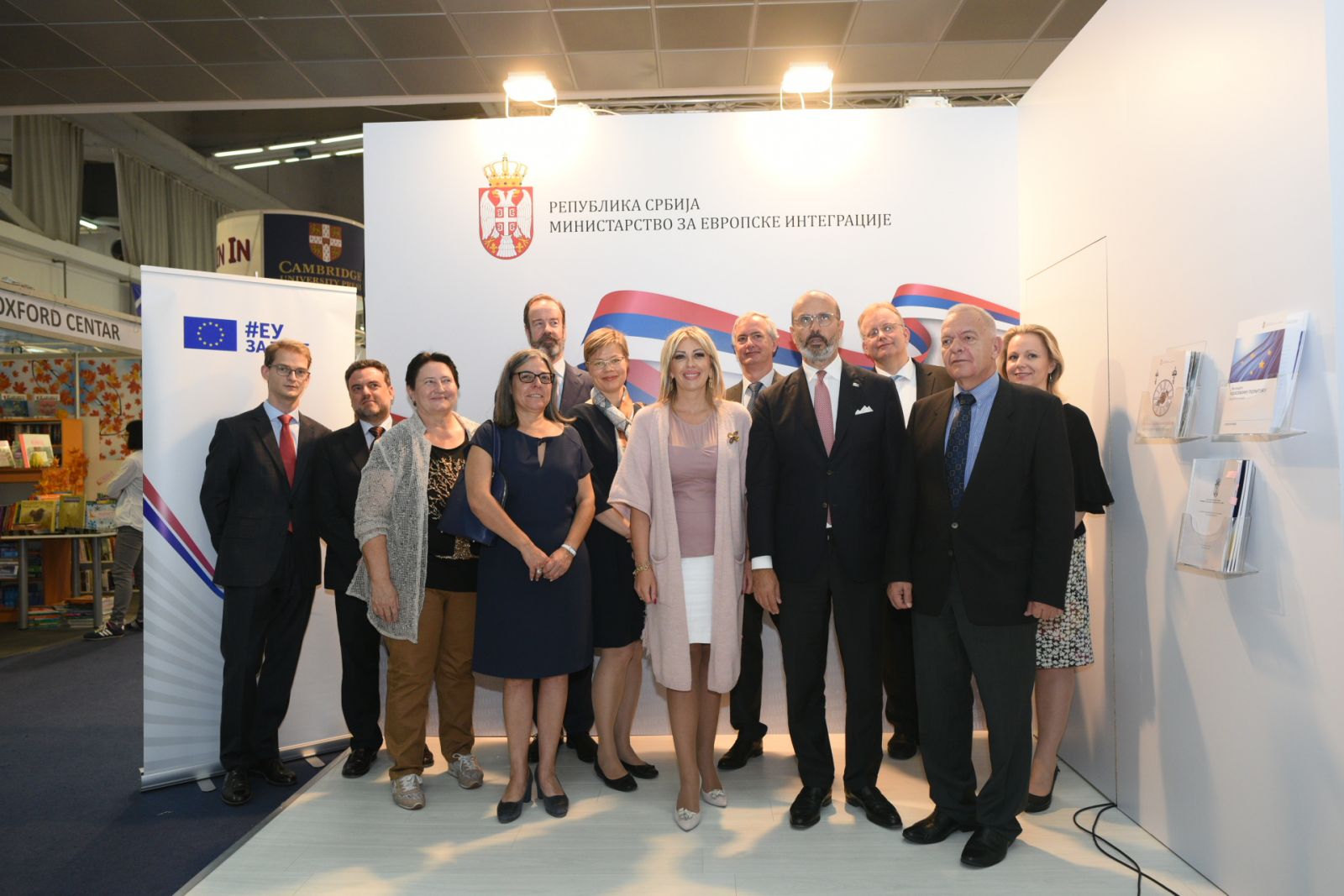
Today, at the booth of the Ministry of European Integration at the International Belgrade Book Fair Minister of European Integration Jadranka Joksimović has said that Serbia remains a reliable candidate for EU membership, dedicated first of all to the reform processes.
"Serbia, with all the problems that come our way, understands that politics and the EU are undergoing changes, but as a responsible government and a responsible country, we are committed to strategic goals that are primarily in the interest of our citizens," Joksimović said at the booth of the Ministry of European Integration, where she presented two publications.
She has said that in the future, Serbia will mostly deal with the reform process, primarily because of our well-being and full membership in the EU, expecting that the EU will also show credibility and respond to Serbian citizens’ efforts.
She has acknowledged large presence of all our friends from the embassies of the EU member states in Serbia, including the head of the EU Delegation to Serbia, Sem Fabrizi.
"Usually, the most delightful event in Serbia for all our citizens is the Belgrade Book Fair, and for the third year in a row, the Ministry has been trying to bring to the attention of our citizens, through its various publications, all the benefits and challenges that arise in the process of European integration, in order to demonstrate all that we do and to make this process more visible, transparent and clear to our citizens," Joksimović has said.
She has stressed the importance of the issue of our national identity in the accession process, and has stated that the citizens are sometimes sceptical and have a fear that we might lose some of our national, cultural and historical identity, and even our linguistic identity, due to our accession to the EU.
"This, of course, is simply not true, and in that sense we hope that this publication, which we present today and which is called "The past revived by Europe", will show how, with the help of our European partners, and primarily through their financial assistance, we have helped the restoration of some of the most significant cultural and historical monuments of our country in all parts of Serbia," Joksimović said.
She has stressed that our national identity and cultural and historical monuments of Serbia are part of sustainable tourism and represent economic potential, as well as our national cultural public diplomacy towards the world and towards the EU.
"I would like to present to our citizens these 17 projects which we have included in this publication, of which some are partly and some fully funded from EU funds," Joksimović has said.
These are the Golubac Fortress, the Pirot Fortress, the Fortress in Bač, the Fetislam Fortress near Kladovo, the Synagogue in Subotica, the Log Cabin Church in the village of Jablanica near Zlatibor, the Monastery in Bač, Felix Romuliana, Lepenski Vir, Senjski Rudnik, Pavilion of Prince Miloš in Aranđelovac, Art Nouveau in Subotica, Homeland Museum in Priboj, Radoje Domanović Memorial House, Concordia - the central building of City Museum in Vršac, Rectorate building of the University of Belgrade, and Jevremovac Botanical Garden in Belgrade.
Joksimović has stressed that it is important for our citizens to be informed about these projects, because they often wonder where all this money we receive from the EU goes, whether it was spent in a correct and transparent manner, and whether is meant for the regional development of Serbia.
"The projects are implemented throughout our country and no region is neglected. All potentials of historical importance, but also of significance for the future sustainable development of both tourism and economies of these regions, have been identified,” Joksimović said.
She has also presented the second publication "Get to know EU Cohesion Policy", that, as she said, was extremely important and that was aimed primarily for the professional public.
"The cohesion policy is, in fact, a policy of reducing the inequalities between the European regions, a form in which these structural and cohesion funds, worth billions of euros, were available to all the countries that have become EU Member States, and which is more than we have at our disposal as a candidate country now," Joksimović has said.
She has added these countries have, as a result, significantly raised the standard of living of their citizens, reduced the level of inequality compared to the most developed EU countries, and made a huge difference in terms of development of their economies and better life of their citizens.
"This publication is actually a way to understand how, at this stage, we are preparing to transfer, at the moment when Serbia becomes an EU member, to using these funds. We must not allow what some of the countries have, unfortunately, allowed in the early years of their EU membership, and that is to lose the money which was made available to them, "Joksimović has said.
She has stated that this is why we are currently preparing ourselves, and that the Ministry of European Integration is in charge of the future Law on Cohesion Policy exactly so that we would not, at any moment, damage the citizens concerning the money that will be at our disposal.
At the booth of the Ministry of European Integration, Sem Fabrizi and Päivi Alatalo, Deputy Ambassador of Finland, the country currently holding the Presidency over the EU also addressed the public and, among others, there were the Ambassadors of Slovakia, Portugal, Belgium, the Netherlands and Bulgaria, along with the representatives of the embassies of Greece, Croatia, Germany, Italy, Sweden, Spain, Romania, Czech Republic, Hungary, and the representative of the Austrian Cultural Forum.
Source: Tanjug












